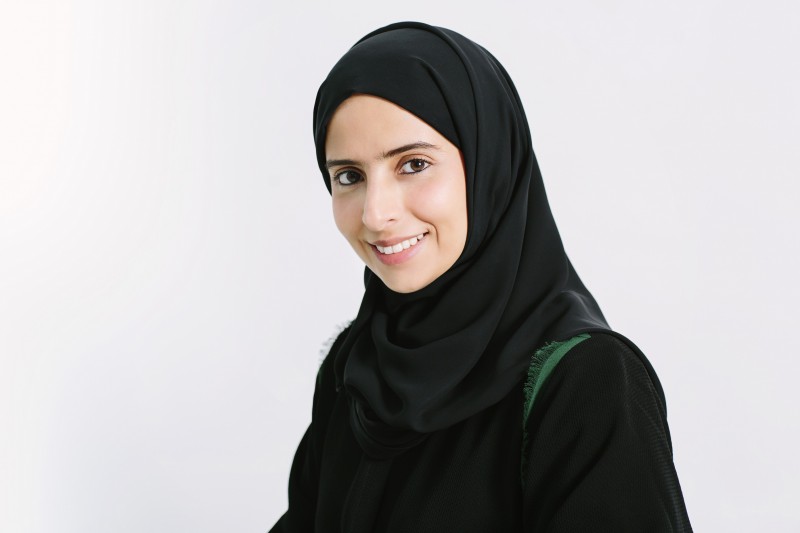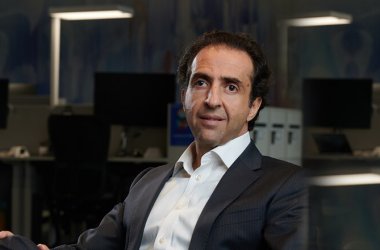Amna Sultan Al Owais, DIFC Courts’ chief executive and registrar, knows that legal systems have to change. The organisation is already aiming to be a pioneer in its Blockchain use and is committed to remaining ahead of the curve by embracing new technology and innovative approaches to dispute resolution.

“Why should courts be different from any other business around the world? People want choice and service. Choice creates competitiveness and cost-efficiency.” Amna Sultan Owais knows that the legal industry has been resting on its laurels for too long.
The DIFC Courts chief executive and registrar, a judge for TahawulTech.com’s Future Enterprise Awards on Sunday 14th October at Jumeirah Emirates Towers, is committed to continuing the legacy of an institution that has already achieved global acclaim for its attitude to change. Al Owais has been in the role for a little more than eight months and is hoping to emulate the groundwork laid by her predecessors and colleagues. “Working with the likes of [former chief justice] Sir Anthony Evans, [current chief justice] Michael Hwang and [former CEO] Mark Beer has been an amazing opportunity,” she says. “They gave me a path to be myself and allowed me to contribute as a female Emirati.”
Having been a part of the rise of DIFC Courts since groundwork for its launch began in 2006, Al Owais draws immense pride from being able to shape the organisation’s future. “I’ve grown with DIFC Courts,” she says. “I’ve built my experience and passion around what court systems should look like, and I’m determined to make sure we set the benchmark for how courts operate in the future.”
Governed by English common law, verdicts at DIFC Courts are enforced in jurisdictions including England, New York and Singapore. Its Smart Small Claims Tribunal – a video-driven digital court that can be accessed by case participants from around the globe – has already received international acclaim, while DIFC Courts has recently advised the Astana International Financial Centre on building a court system for English and common law in Kazakhstan. British member of parliament Antoinette Sandbach has previously lauded the system for being quicker than courts in the UK. “It’s amazing to help other court systems and nations,” Al Owais says.
While DIFC Courts has already received widespread recognition for its innovative approaches to changing legal systems, the best is yet to come. “We’re halfway through our five-year strategy,” Al Owais says. “We want to deliver service and innovation excellence as well as connectivity. We depend on technology to enable us to achieve those objectives. Unless we use technology, we won’t be able to build a court of the future. It smooths and streamlines procedures and allows us to handle cases more efficiently.”
Although Al Owais believes that DIFC Courts has already made its mark as an innovative technology end user, she is cognizant of the next steps it must take to remain ahead of the curve in the legal industry. “To an extent, I think we’re already there in terms of being technologically enabled, but now we have to think about how we can change mindsets in the legal industry,” she says. “One of the main advantages we have is that we’re a relatively small organisation, so we can move fast. We’ve got that flexibility to introduce change.” Al Owais knows that she must set the pace and tone for this transformation. “Leaders need to manage change and perception,” she says. “That allows others to be ambassadors for change. It’s all a question of mindset, how governments and judiciaries embrace technology, and whether they see it as a tool, instead of a threat.”
At the core of DIFC Courts’ technology strategy is the commitment to promoting settlements among parties. “Our guiding principle is delivering a court as a service,” Al Owais says. DIFC Courts currently boasts an impressive record of resolved cases that testifies to this pledge – 80% of Small Claims Tribunal cases are resolved in less than four weeks, with AED 2.1 billion ($1.1 billion) of claims filed between January to June of this year. “We don’t believe that issuing judgments alone is a resolution,” Al Owais says. “What’s more important is maintaining and saving relationships of business communities. Having technology as an enabler and tool to succeed in our operations is really important, because it helps us to achieve that ultimate, overarching goal.”
A crucial part of making courts accessible is ensuring that the services at DIFC Courts are available to case participants around the globe. With the UAE sitting at the intersection of Europe, Africa and Asia, participants expect a first-class court experience without having to leave their home country. “Dubai is a centre for international trade and finance, and it needs technology to be as accessible as possible,” Al Owais says. “Systems need to be accessed from anywhere. Unless we make technology a key tool for us to look at future cases and initiatives, we will not be able to lead the way in how we maintain standards of service.”
In July, DIFC Courts partnered with Smart Dubai to create the “world’s first” court of the Blockchain, an alliance that will explore how to aid the verification of court judgments for cross-border enforcement. The organisation’s joint research will combine expertise to investigate handling disputes arising out of private and public Blockchains, with regulation and contractual terms encoded within smart contracts. Currently, Blockchain-based smart contract transactions are irrevocable, and there is no technical means to unwind a transaction. The joint taskforce will model smart contracts across Blockchains that allow for various exceptions and conditions for more efficient dispute resolution.
“We will use this platform to make our vision of using Blockchain a reality,” Al Owais says. “When we talk about Blockchain-powered courts, one key thing is the enforcement mechanism – working with partners around the world to make sure judgments are authentic. Transparency in the legal industry is so important. Within Blockchain, there’s no mechanism for security if things go bad. We’re looking at how we can go through the next phase and become the courts of choice for resolving smart contract-related disputes.”
A similar partnership was agreed with the Dubai Future Foundation in 2017 to launch the Courts of the Future Forum, which aims to build a hub for best practices among worldwide courts and techpreneurs. “These kinds of alliances allow us to be at the forefront of technology,” she says.
DIFC Courts is in the process of working towards fulfilling the objectives of Dubai’s 2021 Paperless Strategy and is looking to tackle the challenge in manageable chunks, the legal industry being famed for its attachment to paper-based processes. “We don’t want to give ourselves an impossible mandate,” Al Owais says. “We want to tackle this objective in small pieces rather than taking the task on all at once. I want to make sure we are in line with UAE and Dubai strategies, and for DIFC Courts to deliver certainty and security for companies setting up in DIFC.”
In September, meanwhile, DIFC Courts is looking to relaunch its case management system, which can already be accessed through the DIFC Courts website and portal, and will soon be accessible through an app. “This will be hugely helpful to our Small Claims Tribunal,” Al Owais says.
Another low-key example of how the court’s thirst for technology is its innovative use of AV systems within the court rooms themselves. Motion sensor cameras and voice-sensitive microphones are at play, amplifying speakers’ voices when needed. “Our court is wired with technology,” Al Owais says. “It’s important to use disruptive technology without disrupting the court itself.”
Ever mindful of the future, Al Owais is already beginning to eye ways that DIFC Courts can prepare for an age in which staff will have to work alongside IT systems and machines. “If we think about technological change in a positive way, human intervention will always be needed in the legal profession,” she says. “Artificial intelligence will undoubtedly make things more efficient and will serve as another tool to make the judicial system more enabled and ready for future challenges.”
Al Owais believes Alibaba co-founder Jack Ma hit the nail on the head at this year’s World Economic Forum, when he laid out his vision for how humans will work with machines in future. “He said that we can’t teach children to compete with machines, and that teachers should focus on softer skills,” Al Owais says. “The future is coming, and we need to be equipped to handle a wave of new systems. There might be certain roles that diminish in influence, but other new ones will be created. I don’t see technology as a threat; we should embrace the fact that new things are coming our way. Instead of worrying about the rise of certain technologies and doing nothing about it, it’s important to be at the forefront of using new technologies.”
In the meantime, Al Owais is proud to represent the human touch of DIFC Courts. As well as being one of its longest-serving staff members, she is the organisation’s first Emirati female registrar. “I want to show to the community that with hard work, anything is possible, whatever industry you work in,” she says. “The support of the UAE Government is really helping to enable female participation in senior positions.”





